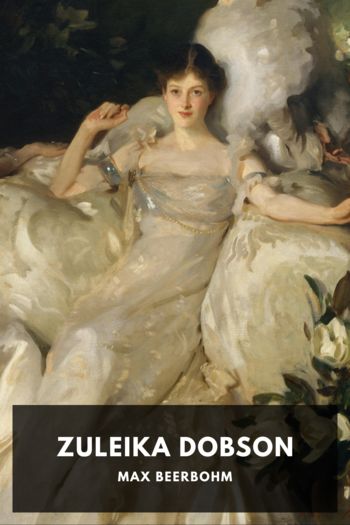The Works of Max Beerbohm - Max Beerbohm (electric book reader .txt) 📗

- Author: Max Beerbohm
Book online «The Works of Max Beerbohm - Max Beerbohm (electric book reader .txt) 📗». Author Max Beerbohm
For my own part, I fancy Caroline was innocent of any infidelity to her unhappy husband. But that is neither here nor there. Her behaviour was certainly not above suspicion. It fully justified George in trying to establish a case for her divorce. When, at length, she went abroad, her vagaries were such that the whole of her English suite left her, and we hear of her travelling about the Holy Land attended by another family, named Bergami. When her husband succeeded to the throne, and her name was struck out of the liturgy, she despatched expostulations in absurd English to Lord Liverpool. Receiving no answer, she decided to return and claim her right to be crowned Queen of England. Whatever the unhappy lady did, she always was ridiculous. One cannot but smile as one reads of her posting along the French roads in a yellow travelling-chariot drawn by carthorses, with a retinue that included an alderman, a reclaimed lady-in-waiting, an Italian count, the eldest son of the alderman, and “a fine little female child, about three years old, whom Her Majesty, in conformity with her benevolent practices on former occasions, had adopted.” The breakdown of her impeachment, and her acceptance of an income formed a fitting anticlimax to the terrible absurdities of her position. She died from the effects of a chill caught when she was trying vainly to force a way to her husband’s coronation. Unhappy woman! Our sympathy for her is not misgiven. Fate wrote her a most tremendous tragedy, and she played it in tights. Let us pity her, but not forget to pity her husband, the King, also.
It is another common accusation against George that he was an undutiful and unfeeling son. If this was so, it is certain that not all the blame is to be laid upon him alone. There is more than one anecdote which shows that King George disliked his eldest son, and took no trouble to conceal his dislike, long before the boy had been freed from his tutors. It was the coldness of his father and the petty restrictions he loved to enforce that first drove George to seek the companionship of such men as Egalité and the Duke of Cumberland, both of whom were quick to inflame his impressionable mind to angry resentment. Yet, when Margaret Nicholson attempted the life of the King, the Prince immediately posted off from Brighton that he might wait upon his father at Windsor—a graceful act of piety that was rewarded by his father’s refusal to see him. Hated by the Queen, who at this time did all she could to keep her husband and his son apart, surrounded by intriguers, who did all they could to set him against his father, George seems to have behaved with great discretion. In the years that follow, I can conceive no position more difficult than that in which he found himself every time his father relapsed into lunacy. That he should have by every means opposed those who through jealousy stood between him and the regency was only natural. It cannot be said that at any time did he show anxiety to rule, so long as there was any immediate chance of the King’s recovery. On the contrary, all impartial seers of that chaotic Court agreed that the Prince bore himself throughout the intrigues, wherein he himself was bound to be, in a notably filial way.
There are many things that I regret in the career of George IV, and what I most of all regret is the part that he played in the politics of the period. Englishmen today have at length decided that Royalty shall not set foot in the political arena. I do not despair that some day we shall place politics upon a sound commercial basis, as they have already done in America and France, or leave them entirely in the hands of the police, as they do in Russia. It is horrible to think that, under our existing regime, all the men of noblest blood and highest intellect should waste their time in the sordid atmosphere of the House of Commons, listening for hours to nonentities talking nonsense, or searching enormous volumes to prove that somebody said something some years ago that does not quite tally with something he said the other day, or standing tremulous before the whips in the lobbies and the scorpions in the constituencies. In the political machine are crushed and lost all our best men. That Mr. Gladstone did not choose to be a cardinal is a blow under which the Roman Catholic Church still staggers. In Mr. Chamberlain Scotland Yard missed its smartest detective. What a fine voluptuary might Lord Rosebery have been! It is a platitude that the country is ruled best





Comments (0)